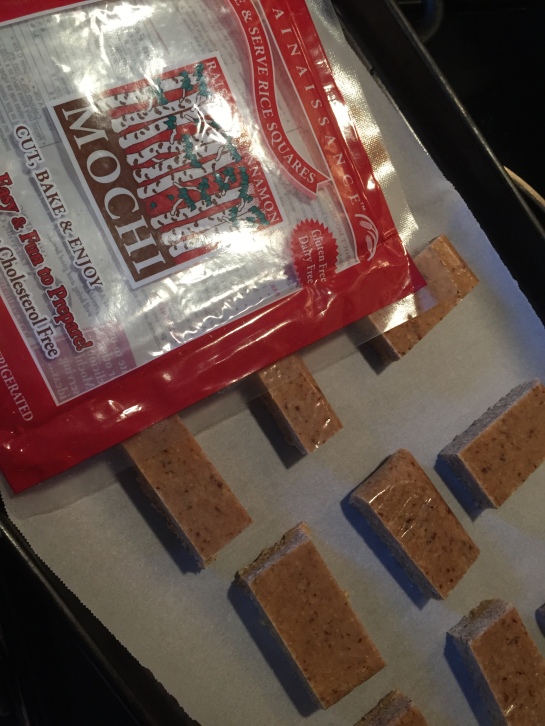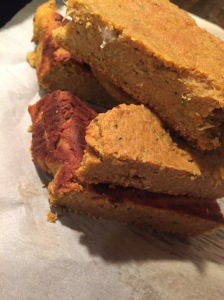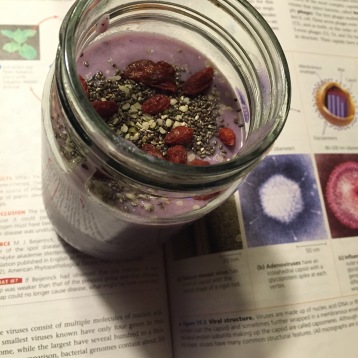Your brain during exam week!
As much as I love food science and food chemistry, nutrition and biology certainly hold a candle to both of the aforementioned subjects. I delight in learning about the needs of our human machines! As busy as I’ve been throughout this week, it prompted me to do a little digging. What can I do to best improve and sustain my performance during testing? How can I keep my wrinkly clump of neurons and cortex and all that jazz from deflating like a balloon? I’m currently on the search for some interesting articles to read all about the subject. However, from experience as a student, I think I have at least some first hand experience with battling brain frazzle.
Well, we can start with something yummy to eat! The brain operates on a balance of all foods, but its substrate of choice is glucose! Unless, of course, you’re keto-adapted, but that’s another story for another day… needless to say, I am not one of those people. As a student, it’s better for me not to experiment with different kinds of eating patterns while I am feverishly at work trying to concrete textbook and teacher lessons in my brain. Rather, I should just experiment with recipes instead:
- cinnamon-raisin mochi puffs.

- “cacao-dough” and “neopolitan” “poptarts” (“””””””!)
- pumpkin zucchini muffins, made into bars, thanks to My Little Tablespoon 🙂

- Mixed berry smoothies …

… with a side of virus studying
And of course, life’s simplest of joys: fresh and sweet honeycrisp apples, oven-roasted vegetable rainbows, briny lupin beans. Um, maybe some of those are just my own 🙂
Of course, it’s only natural that I as a food blogger would make la nourriture my prized weapon in my arsenal of tools to stave off a melty brain. But I’m also adamant that there are other ways to encourage le cerveau to stay plump and fresh all week (excuse my French, no pun intended, I just had a French exam). These are just a few.
- Excercise while you study! I’m not kidding! Studies show that gentle excercise, like light walking while listening to a pre-recorded lecture or audio book does wonders for later recall. I’d imagine that it has something to do with exercise’s ability to increase dopamine production, which has been shown to help students retain learned information. Moreover, moving your body can be a good way to clear your mind or release any pent-up anxieties you may have about test taking. I certainly could have used a post-Lit exam yoga session…
- Keep on top of your schedule! Whether you use a calendar, planner, notebook, journal, or whatever else, this is crucial. I flip flop between using all kinds of organizational tools, but currently my favorites are Google Calendar and Evernote. Wunderlist is great too! By physically putting down on paper or on a piece of technology your plans, goals, and tasks that you need to do, you save yourself a lot of mental gymnastics of “oh, what do I have to do today…?” and “what have I already done?” The brain falls privy to overwhelm and distraction when there is too much stimuli cluttering your environment and your internal thoughts.

With Google Calendar, I’m able to put in all my tasks for the day and block out times for tests, and classes, etc.
- Take breaks. As you probably know, cramming is ineffective. By spacing out your studying (and starting studying sooner – don’t procrastinate!) you give your brain time to solidify what you’ve learned. What’s more, you come back into a study session feeling re-charged and motivated to pick up where you’ve left off.
- However, you know you best– if you feel like you’re in the “flow,” I personally think that it might be effective even to let yourself continue absorbing information, especially if you find that you are making connections and beginning to see the bigger picture.
- When you do take a break, don’t hole yourself into something. You don’t have to go out with friends if you feel like staying in; you don’t have to read your favorite book if you’d rather take a nap; it doesn’t have to be a “rejuvenating cup of tea,” perhaps your noggin is craving a little something extra (hot cocoa, anyone?). Maybe you’re in the mood for some crafting and DIYing, like I was:
- Don’t be too hard on yourself. If you’ve devoted time to your studies and have been paying attention in class, you probably know more than you think you do. Stress has an adverse effect on the brain’s ability to collect and store memories.
Though these tips may be clichés, I believe that they bear repeating. However, everyone’s different. What works best for you when you study? Feel free to share! 🙂




Interesting read! Hope this helps students.
LikeLiked by 1 person
thank you, I hope so too.
LikeLike
Haha. I love how much you love science and biology. And its so nice to see someone sharing their passion so keenly. Our bodies are seriously so fascinating. Medication can be necessary and helpful at times, but I will always be a firm believer in natural remedies, and how just treating our bodies how they want to be treated can do more wonders than any of the crazy hyped up “health” fads marketed up our wazoos. Like your mention of simply getting in a bit of exercise – to both retain information and re energize and ward off anxieties. And of course nutrition. You won’t be able to learn or remember a thing without them glucose stores! I hope your testing is going well!
LikeLiked by 1 person
I’m glad we think on the same wavelength about these things! Testing is finally done, and yes, I couldn’t have done it without a full tank of fuel. Years past I used to think of hunger as a pest that’d get in the way of my studying but giving in to a growling tummy works wonders on being able to crush schoolwork and long study sessions. makes me think of the post you made a few weeks back!
LikeLike
You amaze me so much! I think YOU should be named “cookiesnchem” LOL. Amazing work!
LikeLiked by 1 person
Aw, ty!! But you’ll always be the true cookiesnchem 😊 I feel the same way!
LikeLiked by 1 person